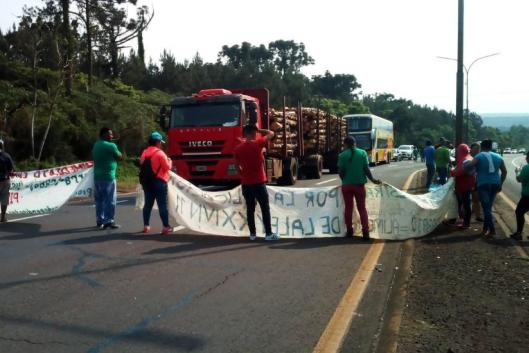The International Day of Struggle against Monoculture Plantations, September 21st recognizes the courage and strength behind the resistance processes against industrial plantations. Let’s share the resistance stories and collectively demand an end to the expansion of this devastating industry.
“Large-scale industrial tree plantations undoubtedly help the international pulp and paper industry secure stable supplies of raw materials. They are also capable of periodically making sizable profits for the huge conglomerates which plant them. They are not designed, however, to benefit Southern countries as a whole, their people or their environments. Although they normally destroy more employment than they create, they nevertheless rely on subsidies extracted from large numbers of people to generate their profits. They do not help preserve land, forests, grasslands, or water sources, but rather exploit local natural advantages ruthlessly. Neither Southern countries nor their local communities, therefore should hope to benefit from the presence of huge plantation and pulp firms producing for export. On the contrary, they must be on their guard against the damage these corporations can wreak.
While plantation tree roots may be within national territory, it is very unlikely that the roots of such companies will be.”
This text was not written recently. It was published almost 15 years ago by Ricardo Carrere. (1) Ricardo was the coordinator of WRM from 1996 until 2010.
We introduce this bulletin with Ricardo’s words, not only because the on-going devastation of industrial monoculture plantations is the focus of this issue, but also because it is 10 years ago that Ricardo passed away. His legacy on the struggle against industrial plantations and his teachings remain very much alive.
Besides the damage and harm caused by industrial plantations that Ricardo alerts about in his text, which are still present today, nowadays, communities living in and around plantations need to also confront politicians, plantation and related companies as well as conservation NGOs with new tactics to keep on trying to make the industry appear ‘sustainable’. The arguments are still as perverse as they were 10 years ago. For example, that trees (meaning, industrial plantations) can save humanity from climate chaos. Tree planting is regularly part of offset schemes, such as REDD+ or the so-called “nature-based solutions”. These plantations allow polluters to claim to be ‘carbon neutral’ or having ‘net zero’ emissions.
Plantation companies and their investors are further expanding their profits by entering new markets besides the pulp and paper, including the production of wood-based textiles, plastics, cosmetics, pharmaceuticals, paints, fertilizers, resins, energy and many others. (2) For example, the European Union will be pushing with the plantations industry’s lobby during the UN climate negotiations to allow biomass (turning trees into wood pellets and burning them to make electricity) to be considered ‘sustainable’ and emitting ‘zero emissions’. Moreover, the world’s largest wood pulp producer Suzano Papel e Cellulose has entered into a new partnership with the company Spinnova to build the first commercial scale production facility of wood-based fibre in Finland. They brand this as ‘sustainable’ fibre.
In reality, the large-scale plantation model cannot be decoupled from histories of colonialism, capitalism, patriarchy and racism. This intensive and violent model is largely based on crimes. Crimes like the stealing of land and livelihoods, unlawful criminalization, sexual assault and harassment, human right violations, oppression of women, labour exploitation, environmental devastations and pollution. Those behind the violent imposition of this model in the global South have often tried to erase the violent pasts and presents of their activities with nice-sounding propaganda. Yet, the ‘sustainable’, ‘net zero’ or ‘carbon neutral’ claims hide countless histories of dispossessions and oppressions that have built and sustained profits for a few. Histories that have largely been silenced and marginalized by forces of money and power.
But these histories also carry another set of powerful and strong stories; stories of community resistance. Their struggles against industrial tree monocultures are struggles for their lands and forests, their communities and their life spaces nurtured with their histories, knowledge and understandings.
Since 2004, September 21 marks the International Day of Struggle against Monoculture Tree Plantations. This is a day for communities, movements, organizations and networks to applaud the courage and strength behind every resistance struggle. Acknowledge the countless resistance stories and join their call for an end to the expansion of these devastating industrial tree plantations.
Let’s turn up the volume of the voices of resistance against industrial tree plantations!
(1) Pulping the South. Industrial Tree Plantations in the World Paper Economy, Ricardo Carrere and Larry Lohmann, 1996
(2) WRM, What could be wrong about planting trees? The new push for more industrial tree plantations in the global South, 2020
